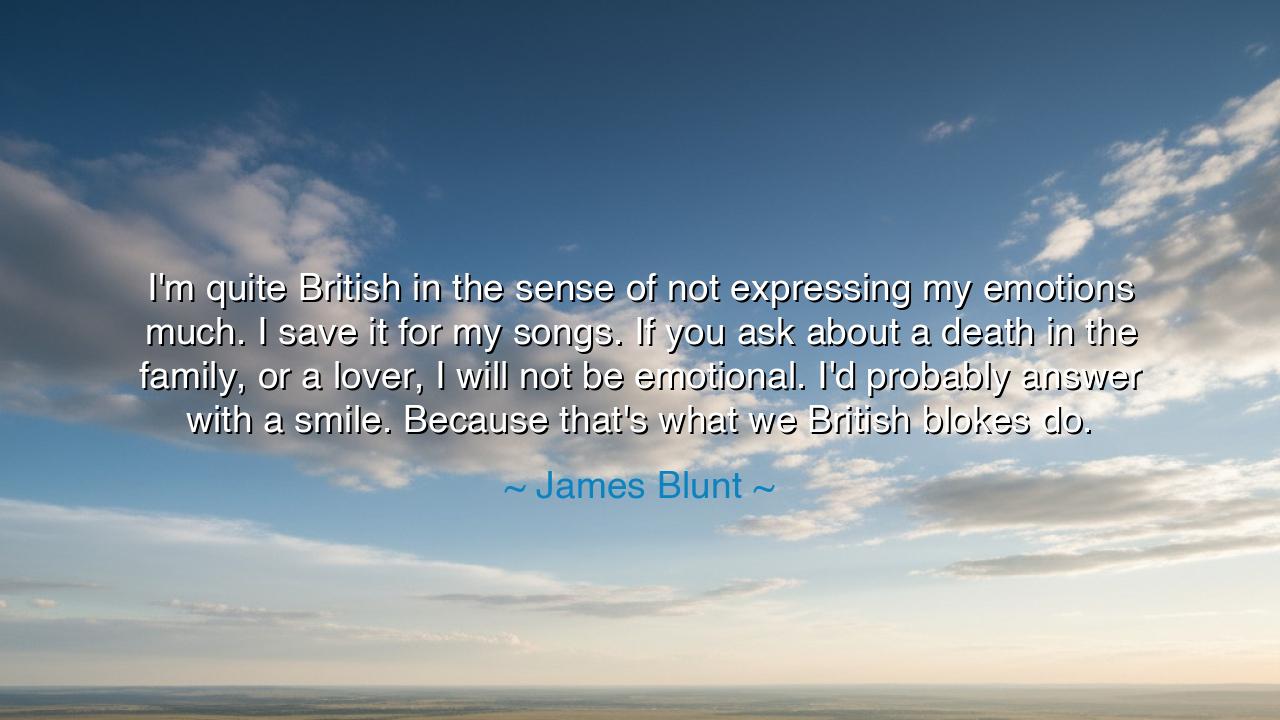
I'm quite British in the sense of not expressing my emotions
I'm quite British in the sense of not expressing my emotions much. I save it for my songs. If you ask about a death in the family, or a lover, I will not be emotional. I'd probably answer with a smile. Because that's what we British blokes do.






James Blunt, soldier-turned-singer, once spoke with candor of his own spirit: “I’m quite British in the sense of not expressing my emotions much. I save it for my songs. If you ask about a death in the family, or a lover, I will not be emotional. I’d probably answer with a smile. Because that’s what we British blokes do.” In this reflection, he reveals the paradox of restraint—that though the heart may be full, the lips may remain silent. Yet silence does not mean emptiness, for in his songs he pours forth all that is withheld, transmuting private sorrow into public beauty.
The ancients would not find this foreign. Among the Romans, especially the Stoics, it was believed that to govern one’s emotions was a sign of strength, that tears and raw displays of grief were weaknesses to be mastered. Yet the poets of that same age, like Virgil, carried within their verses the hidden sorrows of their time. So it is with Blunt: though he may greet the world with composure and a smile, his music becomes his vessel of truth, where the guarded heart speaks freely.
Consider the story of Winston Churchill. Known for his bulldog demeanor and defiant speeches, he carried within him storms of despair that few ever saw. He presented himself to his nation with confidence, resolve, and even humor, for he believed the British spirit required this mask of strength. Yet in his writings, his private reflections, and his quieter moments, his emotions found voice. Like Blunt, he embodied the tradition of men who meet the world with a composed smile, yet allow their true feelings to emerge through words carefully chosen.
The deeper meaning here is that culture shapes the language of the heart. To be “British,” as Blunt says, is not to lack emotion, but to encode it, to veil it, to channel it into art, duty, or humor. The smile he speaks of is not one of indifference, but of discipline—it is a shield, a way to bear pain without burdening others. Yet within this shield lies the recognition that the heart cannot remain forever silent. For this reason, he turns to his songs, where the guarded man is free, and the truths of love and loss are sung without restraint.
Mark this well: each person must find their vessel of expression. Some weep openly, some speak freely, while others, like Blunt, hide their tears behind a smile and let their artistry carry their hidden truth. There is no weakness in restraint, and no shame in expression; what matters is that the burden of the soul finds release, whether in word, song, or deed. For to bury all emotion without outlet is to wither, but to give it form is to create beauty that can endure beyond one’s own life.
Practical wisdom follows: if you are one who struggles to speak your emotions, do not despair. Find a form through which your heart may speak—be it writing, music, craft, or service. Let your smile face the world if you must, but do not silence the truth within. In your private creation, let your sorrows and your joys flow freely, for they may become the very gift that brings healing to others.
Therefore, O seeker, let James Blunt’s words be a lesson in balance. Greet the world with dignity, with a smile, as your culture or your duty requires. But do not deny your soul its freedom. Let your hidden griefs and secret loves take flight through your chosen art, for in this way, you preserve both strength and honesty. And in time, others will find solace in your creation, never knowing the depths from which it came—only feeling its truth, and smiling in return.






AAdministratorAdministrator
Welcome, honored guests. Please leave a comment, we will respond soon